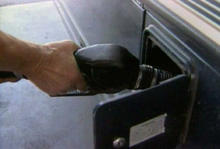Hypocrisy and honesty: I have actually had a number of NoFF days, partly as a means of
OK, that is cheating, in a sense. Not many of us would want to do that for fun, let alone with the serious intention of trying a day without fossil fuels or living the low-carbon life. But at least you can see that I have honestly had a number of NoFF days so I know whereof I speak - as the cliché goes.
Checklist for a real NoFF day: So let's get real and think. Such a day would need to be as close as you can get to a normal working day. So if you walk to work, that's your NoFF transport taken care of. If it's not too cold or too hot, you don't need any heating at home or at work so that's ok too. If you're one of those who has had the foresight to put their money where their mouth is and use genuinely renewable energy for heating, lighting, cooking and sundries like computers, then you don't need a NoFF day as you're already there!
- Transport: no car? no bus? no plane? No sweat: walk or cycle. If you're so far from work or shops that NoFF is not an option, then consider moving house sometime soon so that it is
 . Or what about teleworking?
. Or what about teleworking? - Heating: no oil, coal or gas heating but you can use electric if it's from a guaranteed renewable source, or wood (wood-burner like mine on the right) which is also renewable and so carbon neutral.
- Cooking: as above, not easy without a range that burns wood. Or biogas if you happen to have it. Or you could use a spirit camping stove like the one I take backpacking. Alcohol fuels can be derived from plant matter and so, like wood, are carbon neutral. An electric stove is fine subject to the power being from a utility company which guarantees its renewability.
- At work: use no machinery or equipment which isn't hand-powered or getting its power from renewables (very unlikely).
- Eating: only locally-grown food or, better, your own-grown food which has zero food miles. If you don't know where your food is from, fossil fuel will have been used to get it to you for sure. If it's packaged and/or processed, fossil fuel will have been used in its manufacture.
It's not easy being green: You'll have read through my list, thought about it a bit, and probably decided that the whole idea is impossible. And to a large extent, you'd be right. You can look upon it as a sort of 'thought experiment'; an exercise in assessing dependence. Or you can give it a go anyway and see how much you can manage. Devise a way to give yourself some points; more points for less FF. What did you score? What was the maximum you could score using your assessment? (If you come up with a good way to do this, add a Comment to this post.)
Points mean prizes! And the eventual prize: a habitable planet for our children to inherit. So... have a NoFF day!

 Have you noticed how, when you drive somewhere reasonably local in your car, it seems an impossible distance to imagine doing on foot or by bike. Yet when you do try it without the car, you're quite surprised at how short a distance it actually is. I have the good fortune to live within a few miles of the nearest sea but oddly, my wife Val and I had never actually tried cycling there instead of using the car... for exactly the reasons I just mentioned: it seemed like a long way to go.
Have you noticed how, when you drive somewhere reasonably local in your car, it seems an impossible distance to imagine doing on foot or by bike. Yet when you do try it without the car, you're quite surprised at how short a distance it actually is. I have the good fortune to live within a few miles of the nearest sea but oddly, my wife Val and I had never actually tried cycling there instead of using the car... for exactly the reasons I just mentioned: it seemed like a long way to go. Well we tried it yesterday and - surprise! - it wasn't. Getting there was incredibly easy because it was mostly downhill. Being there was fun as the day was warm and sunny and there were cliffs to explore, beaches for paddling, seabirds and landbirds to see and flowers to enjoy. And, oddly, it was easy cycling home. We had both expected it to be hard.
Well we tried it yesterday and - surprise! - it wasn't. Getting there was incredibly easy because it was mostly downhill. Being there was fun as the day was warm and sunny and there were cliffs to explore, beaches for paddling, seabirds and landbirds to see and flowers to enjoy. And, oddly, it was easy cycling home. We had both expected it to be hard. 

 This anti-airport expansion pledge is being backed by Friends of the Earth,
This anti-airport expansion pledge is being backed by Friends of the Earth, 


